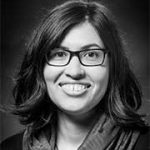- Magdalena Barrera
- Faustina DuCros
- Nikki Yeboah
The College of Social Sciences is proud to be developing a tradition of its faculty as receiving the Career Enhancement Fellowship for Junior Faculty from the Woodrow Wilson National Fellowship Foundation. Assistant Professor of Sociology Faustina DuCros has received a year-long fellowship for the 2017-2018 year while Associate Professor of Mexican American Studies and Acting Chair of the African American Studies Department Magdalena Barrera received the award in 2011-12.
Funded by the Andrew W. Mellon Foundation and administered by the Woodrow Wilson National Fellowship Foundation, the Career Enhancement Fellowship Program seeks to increase the presence of underrepresented junior faculty who are committed to eradicating racial disparities in core fields across the arts, humanities and social sciences. The program allows exceptional junior faculty to pursue scholarly research and writing during their fellowship period in an effort to facilitate the acquisition of tenure.
DuCros’ fellowship project is entitled “Louisiana Migrants in California Oral History Project.” Louisianans were among millions of Black southerners who left their home region during the second phase of the Great Migration. The study documents the migration stream of Louisianans to California, and investigates migrants’ experiences creating community and identity in their destination. Like Southern California (the site of the study’s first phase), the San Francisco Bay Area was a significant destination for Black Louisiana migrants. Though Los Angeles’ Black population was numerically larger, the Bay Area’s Black population ballooned at much higher rates than Los Angeles’ during the World War II period, and cities like Oakland had higher proportions of Black residents. Different neighborhood contexts create variation in how members of racial and ethnic groups construct identities. Thus, the second phase of DuCros’ research — oral history interviews with first- and second-generation Louisianans who helped grow the Bay Area’s Black population at the height of the Great Migration — comparatively elucidates the role of local places in identity construction and documents the community-making experiences of Louisianans in this distinct destination.
DuCros participated in the University Grants Academy, sponsored by the Office of the Provost, the Research Foundation, the Office of Research and University Advancement, as a resource to support faculty members in applying for external funding for research, scholarship and creative activity. The Academy provides workshops and support in preparing a grant application. DuCros was also assisted by colleague Barrera, who worked on three projects during her fellowship year that fell across her two research areas of interdisciplinary textual recovery of Mexican American experiences in the early twentieth century (1910 to 1940) and the mentoring and retention of first-generation students in higher education. Barrera also moved to Austin, Texas, for ten months to gain access to an archival collection housed at the Harry Ransom Center at the University of Texas-Austin.
The first project, “School Smarts: A Reflection of Personal and Pedagogical Insights,” is now an article published in the Journal of Latinos and Education (2014). In this essay Barrera engaged recent studies that show many college instructors still believe that Latino students lack the “school smarts” for academic success. Challenging the notion of “school smarts,” she argues that Latino students contribute to a transformative educational process in which faculty are also learners. In addition, she shares her model for the SJSU mentorship program that she created and continues to coordinate, which facilitates better student-faculty communication and deepens a student-centered learning environment in a large general education course.
The second project, “’Doing the Impossible’: Tracing Mexican Women’s Experiences in Americanization Curricula, 1915-1920,” was recently published in California History (2016). In this article, Barrera analyzes the manuals of the California Commission of Immigration and Housing’s Home Teacher Program in order to gain a better understanding of Mexican immigrant women’s experiences with the California’s Americanization curricula. Scholars have long explored different ways of mining institutional records and other forms of writing by Americanization advocates for insights into the experiences of those who participated in the programs. She argues that we can “do the impossible” of recovering immigrant women’s responses by undertaking close readings of the manual’s lesson plans, sample dialogues, teacher testimonies, and images.
Barrera also made considerable progress on a third project, “Subjection and Subjectivity: Viewing Vulnerability in the Study of the Spanish Speaking People of Texas (1949),” which is currently nearing completion. This essay focuses on a collection of images taken for the Study of the Spanish Speaking People of Texas (SSSPOT, the archival collection housed at UT) which sought to generate much-needed socioeconomic data about the living conditions of Mexican Americans. Barrera contends that in every photograph of people made vulnerable by their race and class status, subjection and subjectivity share an uneasy coexistence. Through close readings of the images and captions, as well as by interrogating the methods of documentary photography, she examines how Mexican subjects engage with the photographer and viewer in ways that may reflect and restore their individuality.
The College of Social Sciences is very excited that it is establishing a pipeline of SJSU faculty who have received fellowships from the Woodrow Wilson National Fellowship Foundation. These fellowships provide critical support for faculty research, scholarship and creative activity (RSCA) efforts. Assistant Professor Nikki Yeboah is in her first year on the tenure track in the Department of Communication Studies, and is being mentored by Barrera and DuCros with plans for her to apply for the Career Enhancement Fellowship for Junior Faculty from the Woodrow Wilson National Fellowship Foundation in a few years.


